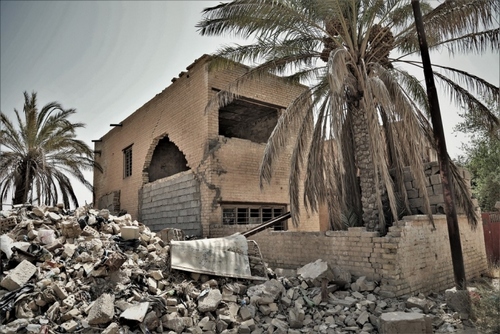Iraq: Returnees face new, unimaginable hardships
When the Islamic State of Iraq and the Levant (ISIL) arrived in Al-Udheim in early 2014, the town experienced large-scale displacement as people fled north to safety in Kirkuk Governorate and the Kurdistan Region of Iraq.

In early 2017, hundreds of those people returned to Al-Udheim, which lies in a flat farming landscape in Khalis district in the east of Diyala Governorate, bordering Salah al-Din Governorate. But many of these people were impoverished after three years of displacement, living on savings and borrowed money. Many more found their homes badly damaged and their livelihoods destroyed.
Balasim,* a mother of seven, owned a hairdressing salon before ISIL attacked her town. “My shop was burned down by ISIL and my house was bombed,” she says. “Now I live in the one remaining room of my house with my children. I had a little money and was able to start a small business selling water and soft drinks, but it’s not enough, so mostly we live on borrowed money.”
Raad* was a farmer before ISIL arrived, then he fled to Kirkuk with his wife, sister and sister’s children. “I used up all my savings in Kirkuk,” he said. “When I came back, my house was burned down and my farm hasn’t been cleared of explosives yet. I want to go back to farming, but it’s not safe for me to farm yet.”
Balasim and Raad participated in a cash-for-work scheme run by local NGO Bothoor Alkhaer and funded by the Iraq Humanitarian Fund. Under the scheme, 1,000 people in Al-Udheim received two weeks’ work, for which they were paid a little over US$200 each. Like many of the others, Balasim used the money to repay mounting debts, while Raad repaired his home. They know exactly what they need: help to restart their lives now they have come home.
“What I really need is enough money to rebuild my house and start a new business,” says Balasim. “I would like to be a hairdresser again. Before ISIL came I had a good life: I had my own business, and my children were happy and healthy. My eldest son was doing well in school. When ISIL came, they killed my husband, and I fled north with my children. Life was hard after we fled, and since we came home it has not improved.”
Raad adds: “The money is welcome, but it is not enough and is so quickly spent. There is no regular work for us. When there is work I take it, but it is not often enough. Sometimes our children have to sell water on the streets to bring in money.”
More than 70 per cent of the people who fled Diyala Governorate—a third of whom are from Khalis—have returned home, but their troubles are far from over. Employment opportunities are few, homes and public buildings are in dire need of repair, and the supply of water and electricity is intermittent. Pockets of insecurity persist in Al-Udheim, which periodically halt return movements across the whole district. Khalis and the neighbouring district of Muqdadiya are heavily contaminated by explosive devices, stalling attempts by the local farmers, such as Raad, to rebuild their lives.
A complex reality needs a holistic response
Normality and crisis are not mutually exclusive. Looking at the circumstances faced by Iraqis returning to their homes as an “either/or” situation masks the complex reality of transitioning out of crisis, and it risks failing to provide people with the assistance they require. Balasim and Raad are fully aware of what they need to restart their lives: decent employment options so they can pull themselves and their families out of vulnerability.
Unemployment creates discontent, whereas decent employment brings manifold benefits. In fragile reforming communities, such as Al-Udheim, jobs bring not only increased dignity and freedom, but also a stake in the community. When people have thriving homes and livelihoods, when they feel like part of a community, they have something to lose if violence erupts again. If they have nothing to lose, their vulnerability to recruitment into armed groups and to committing violent acts increases and whole communities suffer.
Interventions such as Bothoor Alkhaer’s cash-for-work project provide a much-needed one-off cash injection. But as Balasim and Raad explain, the money is not enough to cover their needs. Like many others facing similar situations across Iraq, the people of Al-Udheim need sustained investment in their communities, employment, health care and education, and in rebuilding and replacing damaged infrastructure.
For Balasim and Raad, the acute crisis of conflict and displacement is over, but now they face the task of putting their lives back together—a task that can seem insurmountable in the face of their current reality.
*All names have been changed
Source: UN Office for the Coordination of Humanitarian Affairs
- 272 reads
Human Rights
Ringing FOWPAL’s Peace Bell for the World:Nobel Peace Prize Laureates’ Visions and Actions

Protecting the World’s Cultural Diversity for a Sustainable Future

The Peace Bell Resonates at the 27th Eurasian Economic Summit

Declaration of World Day of the Power of Hope Endorsed by People in 158 Nations

Puppet Show I International Friendship Day 2020

